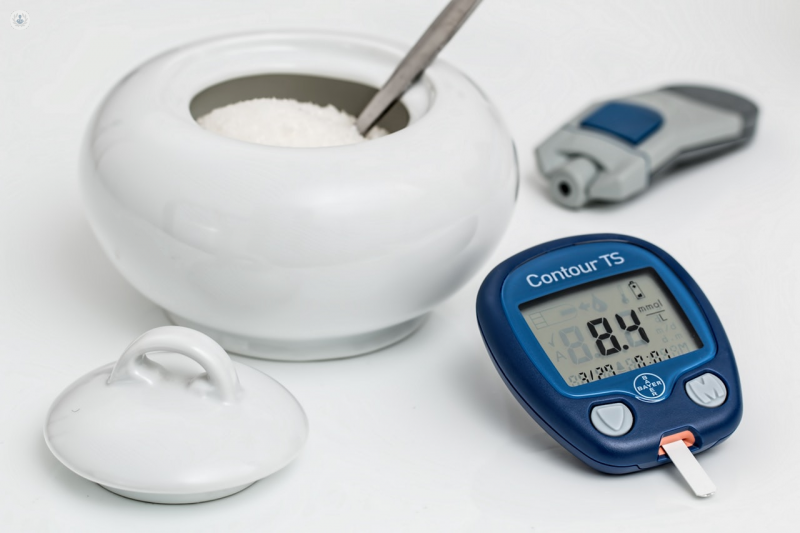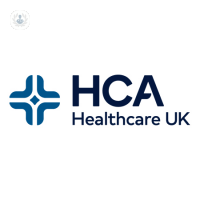What is pre-diabetes?
Pre-diabetes is a term for people who are at a greater risk of diabetes but do not yet have a diabetes diagnosis.

When is someone diagnosed with diabetes?
A person is diagnosed as having diabetes if they show symptoms such as passing urine often, excessive thirst, or unexplained weight loss, as well as abnormal blood sugar levels.
Our blood sugar levels fluctuate all of the time, but in someone with diabetes, the pancreas does not produce insulin properly. Insulin is responsible for converting sugar in the blood into energy. If the body is not producing enough insulin, your blood sugar levels will stay abnormally high.
Diagnosing diabetes involves carrying out different tests to look at what happens if you are given sugar, and what happens to your blood sugar levels over time. You are diagnosed with diabetes if you have:
- A fasting glucose level of ≥7.0mmol/l – this means that your blood sugar levels are high even after your body has had time to absorb sugar from food
- A glucose concentration ≥ 11.1 mmol/l two hours after 75g anhydrous glucose – this means your blood sugar is staying higher than it should even two hours after ingesting a large amount of sugar
Having specific “cut off points” like those outlined above is useful, because when researchers test new treatments on diabetes patients, it is easy to know which patients to include, and different studies can be compared to one another.
When is someone diagnosed with pre-diabetes?
The American Diabetes Association has a definition of pre-diabetes as abnormal glucose levels with the cut-off points for various blood sugar tests being lower than for diabetes. The term “pre-diabetes” was coined to identify people with a greater risk of developing diabetes due to already abnormal blood glucose levels.
However, you are very unlikely to receive a diagnosis of pre-diabetes in the UK. Neither the National Institute of Clinical Excellence nor the World Health Organisation recognises the term. This is because:
- The term pre-diabetes suggests a medical condition that eventually progresses to diabetes. At the moment, however, there is not enough evidence to suggest this is what happens.
- There are no specific treatments for pre-diabetes. You can reduce your risk of developing diabetes by making lifestyle changes, but so can people with normal blood glucose levels. Having a diagnosis of pre-diabetes does not change what you need to do to have a healthy lifestyle or reduce your risk of conditions such as heart disease or kidney disease.
Some doctors might suggest you have pre-diabetes as a motivational strategy to encourage you to adopt a healthier lifestyle, but this should not be taken as an official diagnosis.
08-31-2017 02-07-2024Pre-diabetes
Dr John Bolodeoku - Endocrinology, diabetes & metabolism
Created on: 08-31-2017
Updated on: 02-07-2024
Edited by: Conor Lynch
What is pre-diabetes?
Pre-diabetes is a term for people who are at a greater risk of diabetes but do not yet have a diabetes diagnosis.

When is someone diagnosed with diabetes?
A person is diagnosed as having diabetes if they show symptoms such as passing urine often, excessive thirst, or unexplained weight loss, as well as abnormal blood sugar levels.
Our blood sugar levels fluctuate all of the time, but in someone with diabetes, the pancreas does not produce insulin properly. Insulin is responsible for converting sugar in the blood into energy. If the body is not producing enough insulin, your blood sugar levels will stay abnormally high.
Diagnosing diabetes involves carrying out different tests to look at what happens if you are given sugar, and what happens to your blood sugar levels over time. You are diagnosed with diabetes if you have:
- A fasting glucose level of ≥7.0mmol/l – this means that your blood sugar levels are high even after your body has had time to absorb sugar from food
- A glucose concentration ≥ 11.1 mmol/l two hours after 75g anhydrous glucose – this means your blood sugar is staying higher than it should even two hours after ingesting a large amount of sugar
Having specific “cut off points” like those outlined above is useful, because when researchers test new treatments on diabetes patients, it is easy to know which patients to include, and different studies can be compared to one another.
When is someone diagnosed with pre-diabetes?
The American Diabetes Association has a definition of pre-diabetes as abnormal glucose levels with the cut-off points for various blood sugar tests being lower than for diabetes. The term “pre-diabetes” was coined to identify people with a greater risk of developing diabetes due to already abnormal blood glucose levels.
However, you are very unlikely to receive a diagnosis of pre-diabetes in the UK. Neither the National Institute of Clinical Excellence nor the World Health Organisation recognises the term. This is because:
- The term pre-diabetes suggests a medical condition that eventually progresses to diabetes. At the moment, however, there is not enough evidence to suggest this is what happens.
- There are no specific treatments for pre-diabetes. You can reduce your risk of developing diabetes by making lifestyle changes, but so can people with normal blood glucose levels. Having a diagnosis of pre-diabetes does not change what you need to do to have a healthy lifestyle or reduce your risk of conditions such as heart disease or kidney disease.
Some doctors might suggest you have pre-diabetes as a motivational strategy to encourage you to adopt a healthier lifestyle, but this should not be taken as an official diagnosis.


What is prediabetes and what can be done about it?
By Dr David Cavan
2025-01-14
Prediabetes is a condition where the level of glucose in the blood is higher than normal, but not yet high enough to diagnose diabetes. It usually, but not always, occurs in people who are overweight and have a sedentary lifestyle. People with prediabetes are at high risk of progressing to develop type 2 diabetes. Dr David Cavan is a leading endocrinologist and here he explains what prediabetes is and how it can be reversed. See more


Effectively tackling type 2 diabetes through diet and lifestyle changes
By Dr Fareeha Rizvi
2025-01-12
Learn all about the successful type 2 diabetes reversal programme created by Dr Fareeha Rizvi, leading consultant in endocrinology, diabetes and general internal medicine, in this informative article. See more


Watching for the warning signs of type 2 diabetes
By Professor Luigi Gnudi
2025-01-02
Diabetes is on the rise, and is the fastest growing health threat in the UK, with an estimated 4.5 million people living with the condition. Our expert diabetes physician talks us through what you can do to help take control from the very beginning. See more
Experts in Pre-diabetes
-
Professor Carel Le Roux
PathologyExpert in:
- Obesity
- Pre-diabetes
- Weight loss
- Diabetes
- Diabetes diet
- Metabolic syndrome
-
Dr Bobby Huda
Endocrinology, diabetes & metabolismExpert in:
- Diabetes
- Insulin pump
- Obesity
- Pre-diabetes
- Medicolegal
- Gestational diabetes
-
Dr Prash Vas
Endocrinology, diabetes & metabolismExpert in:
- Diabetic foot
- Diabetes
- Diabetic neuropathy (diabetes pain)
- Diabetic nephropathy
- Hypothyroidism
- Pre-diabetes
-
Dr John Bolodeoku
Endocrinology, diabetes & metabolismExpert in:
- Cholesterol
- Diabetes
- Pre-diabetes
- Thyroid disorders
- Metabolic syndrome
- Thyroid
-
Dr Natasha Patel
Endocrinology, diabetes & metabolismExpert in:
- Diabetes
- Pre-diabetes
- Diabetic nephropathy
- Diabetic neuropathy (diabetes pain)
- Thyroid
- Autoimmune diseases
- See all

Cleveland Clinic London Hospital
Cleveland Clinic London Hospital
33 Grosvenor Place, SW1X 7HY
No existe teléfono en el centro.
By using the telephone number provided by TOP DOCTORS, you automatically agree to let us use your phone number for statistical and commercial purposes. For further information, read our Privacy Policy
Top Doctors

Cleveland Clinic Moorgate Outpatient Centre
Cleveland Clinic Moorgate Outpatient Centre
55 Moorgate, EC2R 6BH
No existe teléfono en el centro.
By using the telephone number provided by TOP DOCTORS, you automatically agree to let us use your phone number for statistical and commercial purposes. For further information, read our Privacy Policy
Top Doctors

London Bridge Hospital - part of HCA Healthcare
London Bridge Hospital - part of HCA Healthcare
27 Tooley St
No existe teléfono en el centro.
By using the telephone number provided by TOP DOCTORS, you automatically agree to let us use your phone number for statistical and commercial purposes. For further information, read our Privacy Policy
Top Doctors
-
Cleveland Clinic London Hospital
33 Grosvenor Place, SW1X 7HY, Central LondonExpert in:
- Cardiology
- Colorectal surgery
- Minimal access surgery (keyhole surgery)
- Gallbladder surgery
- Diagnostic Imaging
- Ultrasound
-
Cleveland Clinic Moorgate Outpatient Centre
55 Moorgate, EC2R 6BH, Central LondonExpert in:
- Digestive
- Cardiology
- Dermatology
- Diagnostic Imaging
- Diagnostics
- Obstetrics and Gynaecology
-
London Bridge Hospital - part of HCA Healthcare
27 Tooley St, Central LondonExpert in:
- 24-hour service
- Cardiology
- Minimal access surgery (keyhole surgery)
- Orthopaedic surgery
- Cardiovascular disease
- Gastroenterology
- See all
- Most viewed diseases, medical tests, and treatments
- Hormone therapy
- Autoimmune diseases
- Nutrition
- Weight loss injections
- Endermologie
- Genetic testing
- Skin biopsy
- Preconception care
- Biomarkers
- Kidney stones







